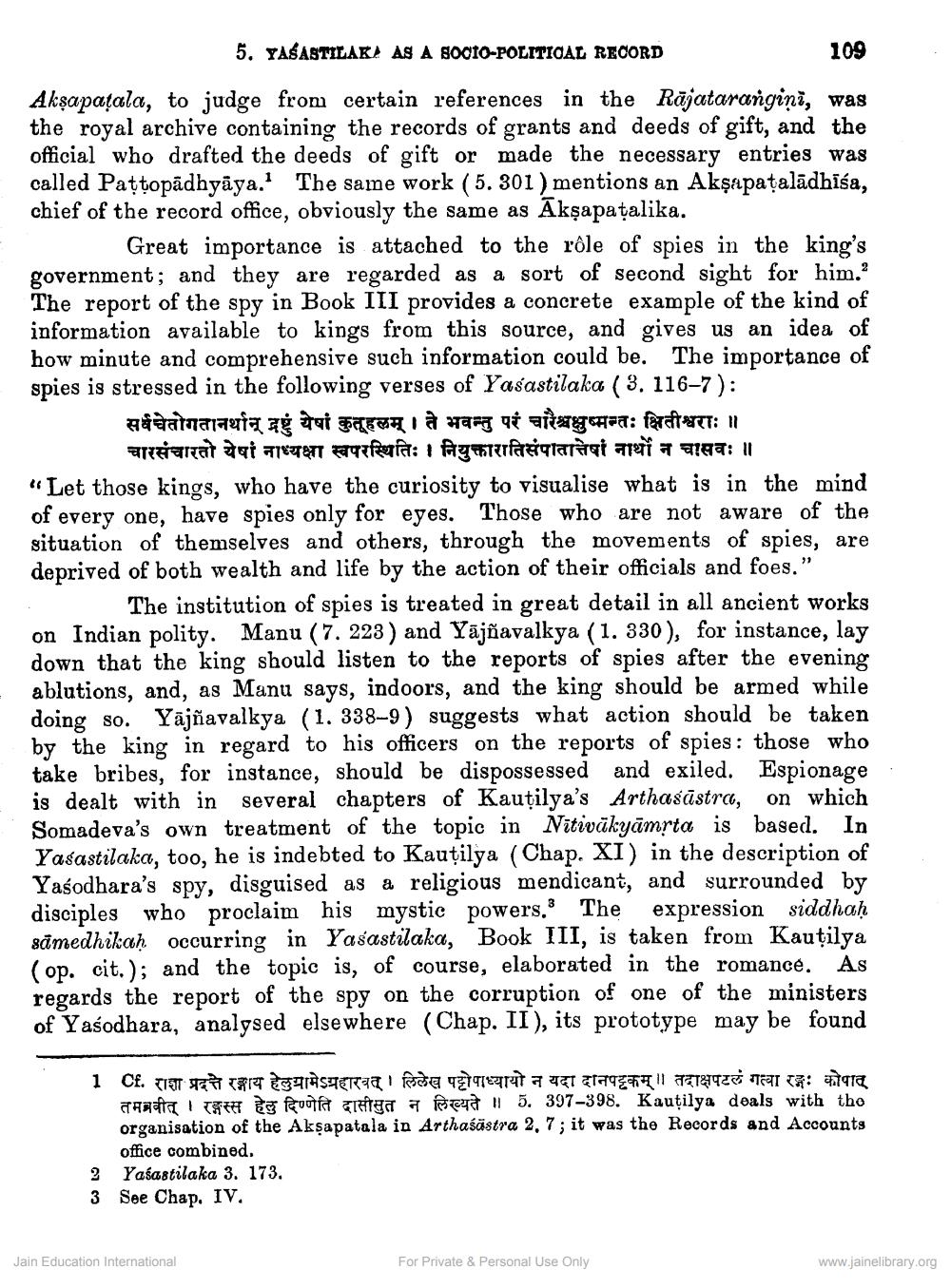________________
5. YASASTILAKA AS A SOCIO-POLITICAL RECORD
109 Akşapatala, to judge from certain references in the Rājatarangini, was the royal archive containing the records of grants and deeds of gift, and the official who drafted the deeds of gift or made the necessary entries was called Pattopādhyāya.' The same work (5.301) mentions an Akşapatalādhisa, chief of the record office, obviously the same as Ākşapatalika.
Great importance is attached to the rôle of spies in the king's government; and they are regarded as a sort of second sight for him.” The report of the spy in Book III provides a concrete example of the kind of information available to kings from this source, and gives us an idea of
ate and comprehensive such information could be. The importance of spies is stressed in the following verses of Yasastilaka (3. 116–7):
सर्वचेतोगतानर्थान् द्रष्टुं येषां कुतूहलम् । ते भवन्तु पर चारैश्चक्षुष्मन्तः क्षितीश्वराः ॥
चारसंचारतो येषां नाध्यक्षा स्वपरस्थितिः । नियुक्तारातिसंपातात्तेषां नार्थो न चासवः ॥ "Let those kings, who have the curiosity to visualise what is in the mind of every one, have spies only for eyes. Those who are not aware of the situation of themselves and others, through the movements of spies, are deprived of both wealth and life by the action of their officials and foes.”
The institution of spies is treated in great detail in all ancient works on Indian polity. Manu (7. 223) and Yājňavalkya (1. 330), for instance, lay down that the king should listen to the reports of spies after the evening ablutions, and, as Manu says, indoors, and the king should be armed while doing so. Yājñavalkya (1. 338-9) suggests what action should be taken by the king in regard to his officers on the reports of spies: those who take bribes, for instance, should be dispossessed and exiled. Espionage is dealt with in several chapters of Kautilya's Arthasāstra, on which Somadeva's own treatment of the topic in Nitiväkyāmrta is based. In Yasastilaka, too, he is indebted to Kautilya (Chap. XI) in the description of Yaśodhara's spy, disguised as a religious mendicant, and surrounded by disciples who proclaim his mystic powers. The expression siddhaḥ sāmedhikah occurring in Yasastilaka, Book III, is taken from Kautilya (op. cit.); and the topic is, of course, elaborated in the romance. As regards the report of the spy on the corruption of one of the ministers of Yasodhara, analysed elsewhere (Chap. II), its prototype may be found
1 C. राशा प्रदत्त रङ्गाय हेलुयामेऽग्रहारवत् । लिलेख पट्टोपाध्यायो न यदा दानपट्टकम् ॥ तदाक्षपटलं गत्वा रङ्गः कोपात्
anafter I T Rota grega 7 Pena ! 5. 397–398. Kautilya deals with the organisation of the Akşapatala in Arthaśästra 2.7; it was the Records and Accounts
office combined. 3 Yaśastilaka 3. 173. 3 See Chap. IV.
Jain Education International
For Private & Personal Use Only
www.jainelibrary.org




